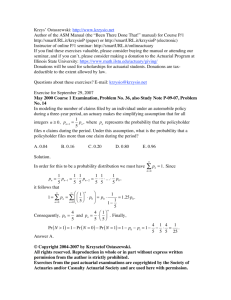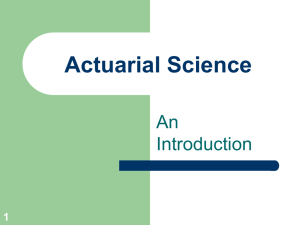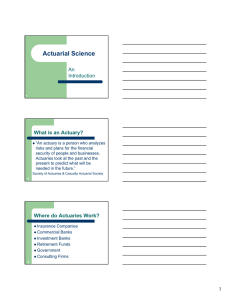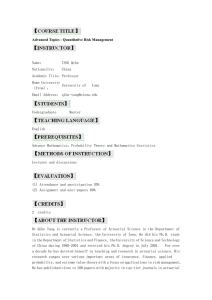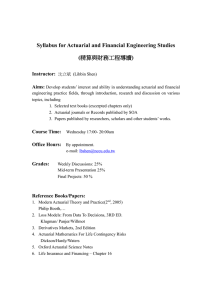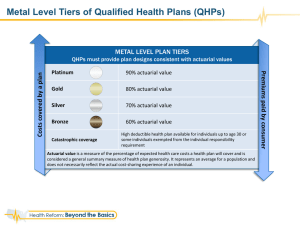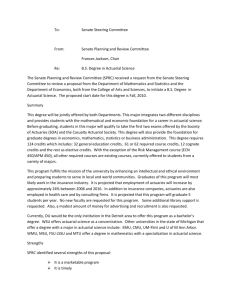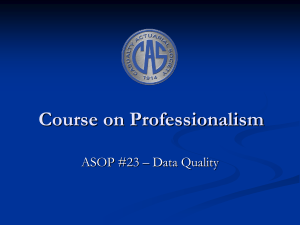Preparing for a Career as an Actuary at Iowa State... 2013 – 2014 Catalog
advertisement
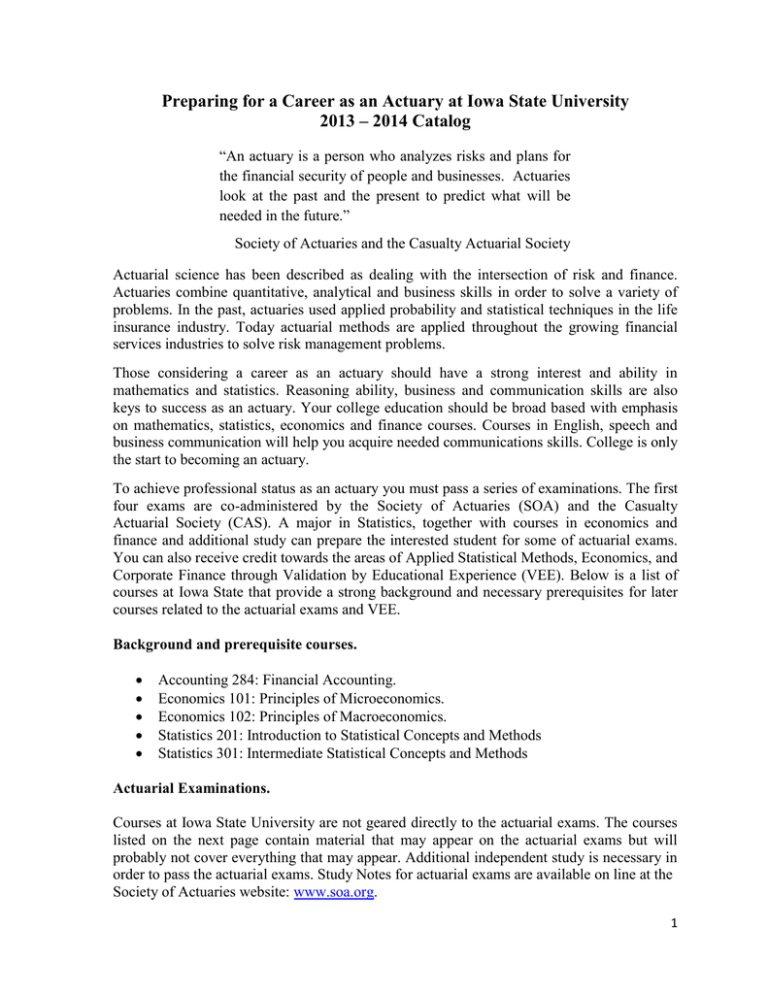
Preparing for a Career as an Actuary at Iowa State University 2013 – 2014 Catalog “An actuary is a person who analyzes risks and plans for the financial security of people and businesses. Actuaries look at the past and the present to predict what will be needed in the future.” Society of Actuaries and the Casualty Actuarial Society Actuarial science has been described as dealing with the intersection of risk and finance. Actuaries combine quantitative, analytical and business skills in order to solve a variety of problems. In the past, actuaries used applied probability and statistical techniques in the life insurance industry. Today actuarial methods are applied throughout the growing financial services industries to solve risk management problems. Those considering a career as an actuary should have a strong interest and ability in mathematics and statistics. Reasoning ability, business and communication skills are also keys to success as an actuary. Your college education should be broad based with emphasis on mathematics, statistics, economics and finance courses. Courses in English, speech and business communication will help you acquire needed communications skills. College is only the start to becoming an actuary. To achieve professional status as an actuary you must pass a series of examinations. The first four exams are co-administered by the Society of Actuaries (SOA) and the Casualty Actuarial Society (CAS). A major in Statistics, together with courses in economics and finance and additional study can prepare the interested student for some of actuarial exams. You can also receive credit towards the areas of Applied Statistical Methods, Economics, and Corporate Finance through Validation by Educational Experience (VEE). Below is a list of courses at Iowa State that provide a strong background and necessary prerequisites for later courses related to the actuarial exams and VEE. Background and prerequisite courses. Accounting 284: Financial Accounting. Economics 101: Principles of Microeconomics. Economics 102: Principles of Macroeconomics. Statistics 201: Introduction to Statistical Concepts and Methods Statistics 301: Intermediate Statistical Concepts and Methods Actuarial Examinations. Courses at Iowa State University are not geared directly to the actuarial exams. The courses listed on the next page contain material that may appear on the actuarial exams but will probably not cover everything that may appear. Additional independent study is necessary in order to pass the actuarial exams. Study Notes for actuarial exams are available on line at the Society of Actuaries website: www.soa.org. 1 Exam P/ Probability o MATH 165, 166 or 166H, 265 or 265H. Calculus I, II, and III. o STAT 341. Introduction to the Theory of Probability and Statistics I. Exam FM/ Financial Mathematics. There are no courses at Iowa State that cover the mathematics involved however background courses in finance and investments may be helpful. The Mathematics Department has occasionally offered an independent study course (MATH 490) on Financial Mathematics. o FIN 301. Principles of Finance. o FIN 310. Corporate Finance. o FIN 320. Investments o FIN 424. Financial Futures and Options Exam MFE/ Actuarial Models - Financial Economics Segment There are no courses at Iowa State that cover actuarial models specifically however background courses in risk management and insurance may be helpful. o FIN 361. Personal Risk Management and Insurance. o FIN 462. Corporate Risk Management and Insurance. Exam C/ Construction and Evaluation of Actuarial Models. o STAT 342. Introduction to the Theory of Probability and Statistics II. o STAT 432. Applied Probability Models o STAT 480. Statistical Computing Applications. Validation by Educational Experience (VEE) The Society of Actuaries recognizes the following sets of courses as meeting the requirements for Applied Statistical Methods, Economics, and Corporate Finance. Applied Statistical Methods STAT 301. Intermediate Statistical Concepts and Methods. STAT 451. Applied Time Series. Economics Although ECON 101 and 102 will meet this requirement, we strongly recommend ECON 301. Intermediate Microeconomics. ECON 302. Intermediate Macroeconomics. Corporate Finance FIN 310. Corporate Finance. 2
